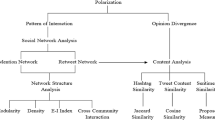Abstract
The study intends to examine the relationship between religious polarisation and message diffusion on social media. Communal and religious messages are shared heavily on social media such as Facebook, WhatsApp, and Twitter (Purnell & Horwitz, 2021). The diffusion of such messages translates into real-life crises many times. The study aims to collect and use the tweets collected using a Twitter API to examine the relationship. We plan to encode the religious polarity of messages manually as religious polarisation is a complex subject. The study uses the diffusion of innovation theory (Rogers, 1962) to understand the diffusion of religiously polarised messages on Twitter. In the study, we propose to test if religious polarisation diffuses more than non-polarised tweets and whether negatively polarised tweets disseminate more than positively polarised tweets. The proposed hypotheses will be tested using Twitter data which will collected usingTwitter API about a religious congregation. The paper aims to contribute to understanding the diffusion of religiously polarised messages on social media and hence to policymakers and governing bodies to mediate the spread of hatred and communal messages on social media.
Access this chapter
Tax calculation will be finalised at checkout
Purchases are for personal use only
Similar content being viewed by others
References
Berger, J.: Arousal Increases Social Transmission of Information. Psychological Science, Vol. 22 (2011)
Chan, J., Ghose, A., Seamans, R.: The internet and racial hate crime: offline spillovers from online access. MIS Q. 40(2), 381–403 (2016)
Chang, Y.T., Yu, H., Lu, H.P.: Persuasive messages, popularity cohesion, and message diffusion in social media marketing. J. Bus. Res. 68(4), 777–782 (2015)
Gruzd, A.: Emotions in the twitterverse and implications for user interface design. AIS Trans. Human-Computer Interaction 5(1), 42–56 (2013)
Henry, D., Stattner, E., Collard, M.: Social media, diffusion under influence of parameters: survey and perspectives. In: Procedia Computer Science, Vol. 109, pp. 376–383. Elsevier B.V (2017)
Heo, Y.C., Park, J.Y., Kim, J.Y., Park, H.W.: The emerging viewertariat in South Korea: the seoul mayoral tv debate on twitter, facebook, and blogs. Telematics Inform. 33(2), 570–583 (2016)
Hong, S., Kim, S.H.: Political polarization on Twitter: implications for the use of social media in digital governments. Gov. Inf. Q. 33(4), 777–782 (2016)
Kapoor, K.K., Tamilmani, K., Rana, N.P., Patil, P., Dwivedi, Y.K., Nerur, S.: Advances in social media research: past, present and future. Inf. Syst. Front. 20(3), 531–558 (2017)
Kelly, J., Fisher, D., Smith, M.: Debate, division, and diversity: political discourse networks in USENET newsgroups. In: Online Deliberation Conference 2005, pp. 1–35 (2005)
Kwon, K.H., Gruzd, A.: Is aggression contagious online? a case of swearing on donald trump’s campaign videos on youtube. Proceedings of the 50th Hawaii International Conference on System Sciences, pp, 2165–2174 (2017)
Lee, J., Agrawal, M., Rao, H.R.: Message diffusion through social network service: the case of rumor and non-rumor related tweets during Boston bombing 2013. Inf. Syst. Front. 17(5), 997–1005 (2015)
Oh, O., Eom, C., Rao, H.R.: Role of social media in social change: an analysis of collective sense-making during the 2011 Egypt Revolution. Inf. Syst. Res. 26(1), 210–223 (2015)
Oh, O., Manish, A., Rao, H.R.: Community intelligence and social media services: a rumor theoretical analysis of tweets during social crises. MIS Q. 37(2), 407–426 (2013)
Pang, N., Ng, J.: Twittering the little India riot: audience responses, information behavior and the use of emotive cues. Comput. Hum. Behav. 54, 607–619 (2016)
Poruthiyil, P.V.: Religious ethics: an antidote for religious nationalism. Bus. Soc. 59(5), 1035–1061 (2020)
Purnell, B.N., Horwitz, J.: Facebook services are used to spread religious hatred in India, Internal Documents Show. Wall Street Journal, pp. 1–9 (2021)
Rogers, E.M.:. Diffusion of Innovations. A Division of Macmillan Publishing Co (1962)
Rozin, P., Royzman, E.B.: Negativity bias, negativity dominance, and contagion. Pers. Soc. Psychol. Rev. 5(4), 296–320 (2001)
Soundararajan, T., Kumar, A., Nair, P., Greely, J.: CORONAJIHAD: An Analysis of Islamophobic Covid19 Haterspeech and Disinformation: The Implications on Content Moderation and Social Media Policy. Equality Labs (2020)
Spence, P.R., Lachlan, K.A., Rainear, A.M.: Social media and crisis research: data collection and directions. Comput. Hum. Behav. 54, 667–672 (2016)
Stanko, M.A.: Toward a theory of remixing in online innovation communities. Inf. Syst. Res. 27(4), 773–791 (2016)
Stieglitz, S., Dang-Xuan, L.: Emotions and information diffusion in social media - sentiment of microblogs and sharing behavior. J. Manag. Inf. Syst. 29(4), 217–248 (2013)
Ullah, R., Amblee, N., Kim, W., Lee, H.: From valence to emotions: exploring the distribution of emotions in online product reviews. Decis. Support Syst. 81, 41–53 (2016)
Volety, T., Valecha, R., Vemprala, N., Kwon, H., & Rao, R. (2018). Cyber-rumor Sharing: The Case of Zika Virus. AMCIS 2018 Proceedings, 2017–2018
Vosoughi, S., Roy, D., Aral, S.: The spread of true and false news online. Science 359(6380), 1146–1151 (2018)
Weber, I., Garimella, V.R.K., Batayneh, A.: Secular vs. Islamist Polarization in Egypt on Twitter. In: 2013 IEEE/ACM International Conference on Advances in Social Networks Analysis and Mining, pp. 290–297 (2013)
Yarchi, M., Baden, C., Kligler-Vilenchik, N.: Political polarization on the digital sphere: a crossplatform, over-time analysis of interactional, positional, and affective polarization on social media. Polit. Commun. 38(1–2), 98–139 (2021)
Yardi, S., Boyd, D.: Dynamic debates: an analysis of group polarization over time on Twitter. Bull. Sci. Technol. Soc. 30(5), 316–327 (2010)
Yim, D., Gao, Q., Khuntia, J.: Semantic and sentiment dissonant framing effects on online news sharing. Commun. Assoc. Inf. Syst. 46, 638–655 (2020)
Author information
Authors and Affiliations
Corresponding author
Editor information
Editors and Affiliations
Rights and permissions
Copyright information
© 2022 IFIP International Federation for Information Processing
About this paper
Cite this paper
Naula, S., Sharma, S.K., Singh, J.B. (2022). Religiously Polarised Message Diffusion on Social Media. In: Elbanna, A., McLoughlin, S., Dwivedi, Y.K., Donnellan, B., Wastell, D. (eds) Co-creating for Context in the Transfer and Diffusion of IT. TDIT 2022. IFIP Advances in Information and Communication Technology, vol 660. Springer, Cham. https://doi.org/10.1007/978-3-031-17968-6_23
Download citation
DOI: https://doi.org/10.1007/978-3-031-17968-6_23
Published:
Publisher Name: Springer, Cham
Print ISBN: 978-3-031-17967-9
Online ISBN: 978-3-031-17968-6
eBook Packages: Computer ScienceComputer Science (R0)





